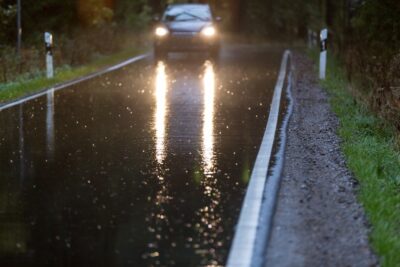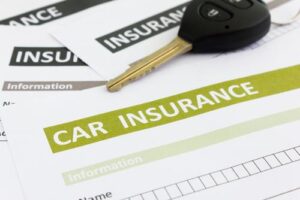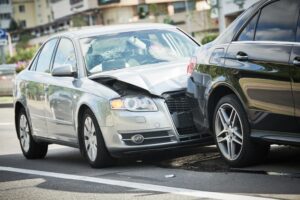
When it comes to auto accidents, bad weather conditions can significantly impact road safety and increase the risk of collisions. In Georgia, where unpredictable weather patterns are common, it’s important to understand how bad weather affects auto accident claims. As Atlanta auto accident lawyers, the legal team of John Foy & Associates can explain it in-depth.
Below, we have compiled frequently asked questions regarding the impact of bad weather on auto accident claims in Georgia. It is our goal to provide insights into liability determination, insurance coverage, evidence requirements, and how a personal injury attorney in Atlanta can help you file a successful car accident claim.
How Does Bad Weather Contribute to Auto Accidents?
Bad weather conditions such as rain, snow, fog, or ice can create hazardous driving conditions, reducing visibility and affecting vehicle traction. As a result, these conditions significantly contribute to auto accidents in Georgia and an Atlanta personal injury lawyer may be needed to help you file a claim successfully.
According to the Georgia Department of Transportation (GDOT), adverse weather conditions accounted for over 10% of all crashes in recent years. Reduced visibility due to heavy rain or fog can make it difficult for drivers to see other vehicles, pedestrians, or road hazards.
Slippery roads caused by rain, snow, or ice can lead to vehicles losing control, resulting in skidding or hydroplaning. Additionally, decreased stopping distances in wet or icy conditions can make it challenging for drivers to stop their vehicles in time to avoid a collision.
Get the strong arm
Can I File an Auto Accident Claim if the Accident Occurred in Bad Weather?
Yes, you can file an auto accident claim in Georgia even if the accident occurred in bad weather conditions. Georgia follows a fault-based system, meaning that the negligent party is responsible for the damages resulting from the accident, regardless of weather conditions. Bad weather alone does not automatically assign fault in an accident.
Each case is evaluated based on the specific circumstances and the actions of the drivers involved. Georgia law requires all drivers to exercise reasonable care and follow traffic laws, even in adverse weather conditions. If a driver fails to do so and causes an accident, they can be held liable for the resulting damages.
How Does Bad Weather Impact the Liability Determination in Auto Accident Claims?
Bad weather can impact the determination of liability in auto accident claims in Georgia. Georgia follows a modified comparative negligence rule, meaning that the damages a plaintiff can recover are reduced by their percentage of fault as long as their fault is less than 50%. When bad weather is a contributing factor, liability may be shared between the drivers involved.
For example, if one driver was traveling above the speed limit during heavy rain while another driver failed to yield at an intersection, both drivers may share fault for the accident. Georgia law recognizes that drivers must adjust their behavior and exercise extra caution in adverse weather conditions.
If a driver fails to take reasonable precautions, such as reducing speed or maintaining a safe following distance, their negligence may be considered a contributing factor in the accident.
What Evidence is Important in Auto Accident Claims Involving Bad Weather?
In auto accident claims in Georgia involving bad weather, gathering relevant evidence, such as photographs of the accident scene, vehicle damage, and road conditions, can help establish the impact of the bad weather on visibility, road conditions, and any contributing factors. Witness statements are also valuable, as they can provide unbiased accounts of adverse weather conditions.
Weather reports from reputable sources, such as the National Weather Service or local news agencies, can serve as official documentation of the weather conditions at the time of the accident. Expert testimony from accident reconstruction specialists or meteorologists may also be beneficial in establishing a causal link between the bad weather and the accident.
How Can I Strengthen My Auto Accident Claim in Bad Weather Conditions?
There are several steps you can take to strengthen your auto accident claim in Georgia when bad weather is involved.
- First, seek immediate medical attention for any injuries sustained in the accident, even if they appear minor at first. This ensures that your injuries are properly documented and your health is prioritized.
- Report the accident to the police, providing accurate and detailed information about the circumstances, including the adverse weather conditions.
- Document the accident scene by taking photographs and gathering information from witnesses, including their contact details.
- Finally, consult with an experienced personal injury attorney who can guide you through the claims process, help gather the necessary evidence, and advocate on your behalf.
Does Insurance Coverage Change in Bad Weather Auto Accident Claims?
In Georgia, insurance coverage generally does not change in auto accident claims that occur during bad weather conditions. The at-fault driver’s liability insurance should cover the damages resulting from the accident, regardless of weather conditions. Additionally, drivers in Georgia are required to carry uninsured/underinsured motorist coverage.
It’s important to review your insurance policy to understand the specific provisions related to weather-related accidents and determine the extent of coverage. Consulting with your insurance provider or an experienced personal injury attorney can help clarify any questions you may have regarding insurance coverage in bad weather auto accident claims.
Are There Any Time Limitations to File Auto Accident Claims in Bad Weather Cases?
In Georgia, there are time limitations, known as the statute of limitations, for filing auto accident claims, including those involving bad weather. The statute of limitations for personal injury claims in Georgia is generally two years from the date of the accident, as stated in Georgia Code § 9-3-33.
It’s important to file your claim within this timeframe to preserve your right to seek compensation. Failing to meet the statute of limitations can result in your claim being barred, meaning you may lose the opportunity to recover damages. However, it’s advisable to consult with a personal injury attorney in Atlanta to ensure compliance.
How Can an Experienced Personal Injury Attorney Help with Bad Weather Auto Accident Claims?
Hiring an experienced Atlanta personal injury attorney can be highly beneficial when dealing with auto accident claims involving bad weather in Georgia. The attorneys of John Foy & Associates have in-depth knowledge of Georgia’s laws and extensive experience in handling similar cases. They can provide valuable guidance and support throughout the claims process.
Contact us today to assess the circumstances of the accident, gather necessary evidence, and build a strong case on your behalf. Our deep understanding of Atlanta personal injury law will help us positively impact your auto claim involving bad weather conditions.
404-400-4000 or complete a Free Case Evaluation form





